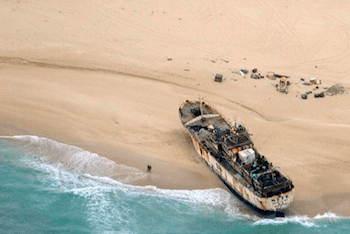Trump Tariffs on Russia’s Oil Buyers Bring Economic, Political Risks
From punishing Brazil to trying to curb imports of fentanyl, U.S. President Donald Trump has wielded the threat of tariffs as an all-purpose foreign policy weapon.

EUNAVFOR reminds us of the the human element of piracy with a break down of who it affects the most, the hostages.

While the issue of piracy off the coast of Somalia has received significant coverage over the past 4 years, with the exception a number of high-profile individuals, the fate of the merchant crews which make up the majority of those held hostage, is not often considered or reported.
This humanitarian tragedy is especially pertinent over Christmas, a time when families normally gather to celebrate.
There are currently 199 men and one woman held hostage in Somalia following the pirating of their ships in the Indian Ocean and all are being held against their will to be used by criminal gangs as part of a ransom business. Since the start of the EU NAVFOR counter-piracy mission in December 2008, a total of 2317 merchant seamen have been held hostage for an average of nearly 5 months. The longest period in captivity is 19 months for the 24 crew members of the M/V ICEBERG 1, who are still being held.
It is estimated that at least 60 merchant seamen have died as a result of their captivity in the hands of the pirates and many more have suffered torture and abuse. 49 of the 200 hostages are held without the collateral of a ship, following the ship sinking or being abandoned which means that their future is less clear as their value is seen as less than that of a ship. Additionally, a recent tactic of the criminal gangs has been to agree to the ransom payment for the return of ship and crew and then hold-back some of the crew when the ship is released to use to negotiate for the release of convicted Somali pirates from the home country of the detained crew members. Currently 4 South Korean and 7 Indian crew members from the M/V GEMINI and the ASPHALT VENTURE are held following the release of the ships.
Today, there are 3 ships abandoned and derelict on the beach, creating a source of potential pollution, whilst their crews, totalling 54 men, remain in captivity.
Piracy in the Indian Ocean affects us all, adding a significant cost to every barrel of oil and every 40ft container which passes through the area. The navies of the world have between 20-30 warships in the region and for the people of Somalia, piracy means that even essential food-aid provided by the World Food Programme (WFP) has to be escorted to prevent the delivery ships being captured.
In the longer term the underlying causes of the piracy crisis need to be resolved within Somalia but at present, the situation for the 200 hostages remains uncertain.
Via EUNAVFOR

Sign up for gCaptain’s newsletter and never miss an update

Subscribe to gCaptain Daily and stay informed with the latest global maritime and offshore news


Stay informed with the latest maritime and offshore news, delivered daily straight to your inbox
Essential news coupled with the finest maritime content sourced from across the globe.
Sign Up